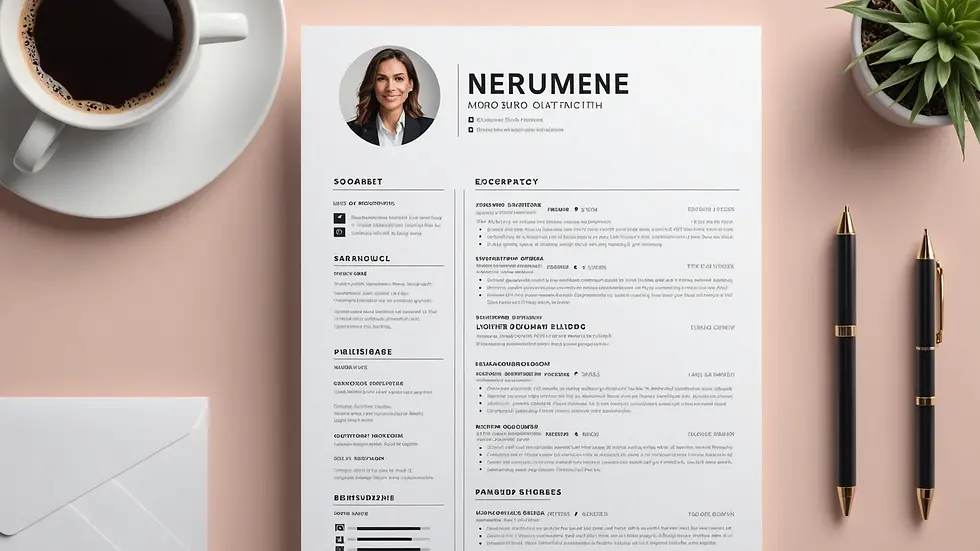Crafting the Perfect Resume
- resumeblitz30
- Dec 4, 2024
- 4 min read
Updated: Dec 20, 2024
Creating a compelling resume is a vital step in the job application process. A well-crafted resume highlights your qualifications and experiences while serving as a powerful marketing tool that distinguishes you from other candidates. With over 60% of job seekers facing rejection due to poorly formatted resumes, ensuring yours stands out can significantly boost your chances of landing an interview. This guide will help you craft the ideal resume tailored to your career goals.
Understanding Resume Formats
Selecting the right resume format is vital, as it should align with your career stage and the job you're targeting. The three most common formats include chronological, functional, and combination.
Chronological Resume: This format organizes your work experience in reverse chronological order, emphasizing your most recent jobs. It's ideal for those with consistent work histories, such as a marketing professional with five years of experience at a leading firm.
Functional Resume: This format prioritizes your skills over work history. It's beneficial for individuals changing careers or those with gaps in employment. For example, someone moving from retail to digital marketing can highlight transferable skills such as customer service and social media management.
Combination Resume: This format merges both chronological and functional elements. It showcases skills at the top and details relevant work experience below. It's particularly useful for seasoned professionals with diverse accomplishments, like an IT manager with expertise in project management and team leadership.
Choosing the right structure significantly enhances how you present your qualifications.

Tailoring Your Resume
Customizing your resume for each application is essential for improving your success rate. Here’s how to tailor your resume effectively:
Analyze the Job Posting: Identify keywords and phrases used in the job description. For example, if a listing repeatedly mentions "data analysis," ensure this phrase appears in your resume if relevant.
Highlight Relevant Experience: Focus on your experiences and skills that directly align with the job. If you have improved a process that saved your previous employer 15% in costs, make this a prominent point.
Remove Irrelevant Information: Exclude experiences that do not relate to the job. If you're applying for a project manager position, you may not need to detail part-time jobs from college unless they showcase relevant skills.
By optimizing your resume for each job application, you increase your chances of capturing a recruiter's attention.
Crafting an Impactful Summary Statement
Your resume should begin with a strong summary statement that succinctly highlights your qualifications. A well-written summary captures the reader's interest. Aim for a clear, concise statement that emphasizes your key skills and experiences.
Be Specific: State your job title, years of experience, and skills. For example, "Results-driven marketing specialist with over four years in digital marketing and content creation."
Professional Tone: Use straightforward language. Avoid jargon unless you are confident it will resonate with the hiring manager.
Value Proposition: Clearly communicate what you bring to the organization. For instance, "I can leverage my expertise in social media strategy to enhance your brand’s online presence."
A compelling summary invites the reader to explore the rest of your resume.
Showcasing Skills Effectively
The skills section of your resume is critical. It should reflect a mix of hard (technical) and soft (interpersonal) skills relevant to the position. Here are some tips for optimizing this section:
Use Bullet Points: Format your skills as bullet points for easy readability. For example:
- Proficient in Adobe Creative Suite
- Excellent verbal and written communication skills
- Strong leadership and team management abilities
Mix Hard and Soft Skills: Include both types of skills. For a sales position, complement hard skills like CRM software proficiency with soft skills like negotiation or relationship building.
Demonstrate Skills Through Achievements: Integrate your skills into your work experience. For instance, if you mention "project management," follow up with how you led a team that completed a project two weeks ahead of schedule.
Providing evidence of your skills enhances your credibility.
Work Experience and Accomplishments
When detailing your work experience, focus on accomplishments instead of merely listing duties. This section demonstrates the value you bring. Follow these strategies:
Quantify Achievements: Use numbers and metrics to showcase your impact. You could say, "Increased customer retention rates by 25% through the implementation of a loyalty program."
Action Verbs: Start bullet points with strong action verbs like “implemented,” “developed,” or “led” to effectively convey your contributions.
Relevance is Key: Prioritize experiences that suit the job you’re targeting. If you're applying for a finance role, emphasize any experience related to budgeting or financial planning.
Highlighting clear, measurable accomplishments ensures your resume catches attention.
Education and Certifications
In your education section, include degrees, relevant certifications, and professional development courses. Be sure to:
Present in Reverse Chronological Order: List your highest degrees first. If you hold an MBA, place it above a bachelor's degree.
Include Relevant Certifications: Certifications like PMP or Six Sigma can boost your application. Mention them if they relate to the job.
Graduation Dates: Include graduation years if recent or pertinent, but omit them if you feel they could lead to age bias.
This section helps establish your qualifications and dedication to learning.
Final Touches
With your tailored resume ready, it’s time to add the finishing touches:
Proofreading: Carefully check for grammatical errors and awkward phrasing. A clean, error-free resume is essential; mistakes can create a negative impression.
Formatting Consistency: Ensure your font sizes, styles, and spacing are uniform throughout the document to create a polished look.
Length Matters: Keep your resume to one or two pages. Most employers appreciate concise resumes that are easy to read, with 80% indicating they prefer one-page documents for candidates with less than a decade of experience.
A professional-looking resume can make a strong impression.
Wrapping Up
Creating the perfect resume is a critical part of the job application process. By understanding different formats, effectively tailoring your resume, and showcasing your skills and accomplishments, you can enhance your standing in a competitive job market. Remember, your resume should reflect not only your experiences but also the unique value you offer to potential employers. With attention to detail and a clear presentation of your qualifications, you can produce a resume that opens doors to new career opportunities.

With dedication and the right strategies, crafting a resume can transform from a daunting task to an empowering experience that leads to exciting new opportunities.



Comments